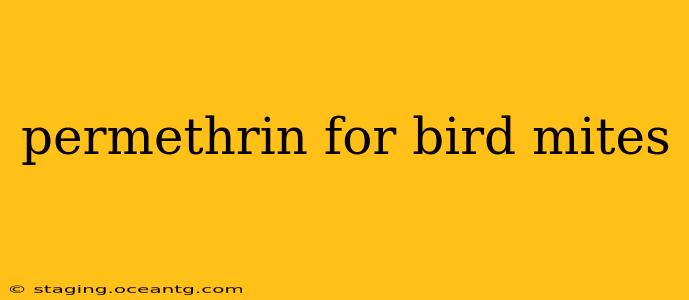Bird mites are tiny parasites that can infest bird nests and, unfortunately, spread to human dwellings. Their bites cause intense itching and discomfort, making their eradication crucial. Permethrin, a synthetic pyrethroid insecticide, is often considered for bird mite control, but its use requires careful consideration and understanding. This guide explores the efficacy, safety, and application of permethrin for treating bird mite infestations.
What are Bird Mites?
Bird mites, primarily species within the Dermanyssus gallinae family, are external parasites that feed on the blood of birds. While they primarily infest birds, they readily bite humans, causing itchy welts and allergic reactions. These mites are tiny, making them difficult to spot, and their infestations can quickly spread throughout homes, especially near bird nests or roosting areas.
Is Permethrin Effective Against Bird Mites?
Permethrin is effective against many insects and arachnids, including bird mites. It works by disrupting the nervous system of the mites, leading to paralysis and death. However, its effectiveness depends on proper application and thorough treatment of infested areas. Simply spraying permethrin once won't necessarily solve the problem; a multi-pronged approach is often necessary.
How to Use Permethrin for Bird Mite Control?
Important Note: Always follow the manufacturer's instructions precisely when using any pesticide, including permethrin. Wear appropriate protective gear, such as gloves, eye protection, and a respirator, during application.
- Identify Infested Areas: Thoroughly inspect your home for areas where bird mites might be hiding. This often includes areas near bird nests, bird feeders, and potential entry points for birds.
- Clean Thoroughly: Before applying permethrin, clean the infested areas meticulously. Vacuum carpets, furniture, and crevices to remove mites, eggs, and feces. Wash bedding and clothing in hot water.
- Apply Permethrin: Apply permethrin according to the label instructions. Pay close attention to cracks and crevices where mites might be hiding. You might need to treat multiple times to ensure complete eradication.
- Ventilation: Ensure adequate ventilation after application to minimize exposure to permethrin fumes.
What are the Safety Precautions When Using Permethrin?
Permethrin is generally considered safe when used as directed, but precautions are vital.
- Keep Children and Pets Away: Keep children and pets out of the treated area until the permethrin has dried completely.
- Protective Gear: Always wear protective gear during application.
- Ventilation: Ensure adequate ventilation.
- Storage: Store permethrin in a secure location, away from children and pets.
- Disposal: Dispose of empty containers according to the manufacturer's instructions.
Are There Alternative Treatments for Bird Mites?
Yes, several alternative treatments can control bird mite infestations. These include:
- Diatomaceous Earth: A natural insecticide that dehydrates mites.
- Vacuuming: Regularly vacuuming infested areas can remove mites and eggs.
- Heat Treatment: High temperatures can kill mites.
- Professional Pest Control: A pest control professional can offer more targeted and effective treatment options.
Can Permethrin Kill Birds?
While permethrin is effective against bird mites, it can be toxic to birds if they are directly exposed to high concentrations. Therefore, it's crucial to apply permethrin carefully and avoid direct contact with birds. If you have birds in your home, consider alternative, less toxic methods.
How Long Does Permethrin Remain Effective?
The duration of permethrin's effectiveness depends on several factors, including the product formulation, environmental conditions (temperature, humidity), and surface type. Check the product label for specific information on residual activity.
Is Permethrin Safe for Humans?
When used according to the manufacturer's instructions, permethrin poses minimal risk to humans. However, some individuals may experience skin irritation or allergic reactions. Always wear protective gear and follow safety precautions.
This information is for educational purposes only and does not constitute medical or pest control advice. Always consult with a qualified professional for specific guidance on bird mite control and the safe use of pesticides.
